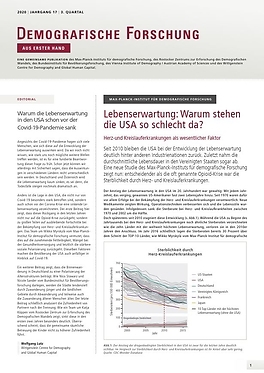September 29, 2020 | Defo News
Life expectancy: Why is the USA doing so badly?

© MPIDR
The new issue (No. 3/2020) of Demografische Forschung Aus Erster Hand, the popular science newsletter with latest research results from demography, has been released.
The Newsletter is available in German only.
"Demografische Forschung Aus Erster Hand" is a joint publication of the Max Planck Institute for demographic Research (MPIDR), the Rostocker Zentrum zur Erforschung des Demografischen Wandels (RZ), the Vienna Institute of Demography (VID), the Wittgenstein Centre for Demography and Global Human Capital and the Federal Institute for Population Research (BiB).
The topics of the new issue are:
1. Life expectancy: Why is the USA doing so badly?
Cardiovascular disease as major cause
(from Max Planck Institute for Demographic Research)
Life expectancy in the USA has been lagging far behind other industrialized nations ever since 2010. Lately, average life expectancy in the United States has even declined. A new study by the Max Planck Institute for Demographic Research now shows that mortality from cardiovascular diseases was a factor more significant than the often-cited opioid crisis.
2. Where we move to
Every year, three percent of all inhabitants in Germany move district
(from Federal Institute for Population Research)
When we talk about migration, we usually mean international migration. But in- and out-migration within national borders plays at least as important a role in the demographic development of the regions. In the 1990s and 2000s, it was even more significant than international migration.
3. The separated child
Separated parents are not necessarily happier when they provide equal care for their child
(from Rostocker Zentrum zur Erforschung des Demografischen Wandels)
Much research has been done on the well-being of children following separation. But what about the parents? A recent study shows that their happiness with the familial and the financial situation declines significantly. Even being in separate places when providing care for their children, the so-called change model, hardly does anything to change this situation.
The newsletter is released four times a year and is available electronically and as a printed version and is free of charge.
All past issues are available online on the Newsletter website. On the website you also have the possibility to subscribe to the Newsletter to get informed about the release of the new issues or to receive the printed versions by mail.